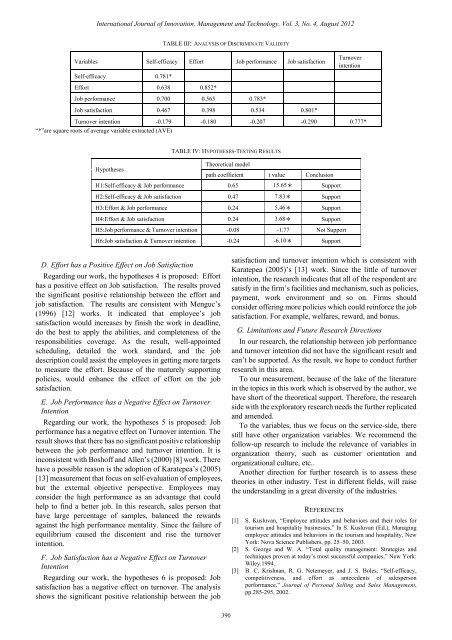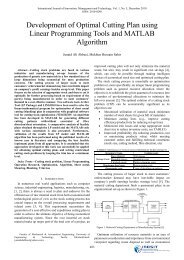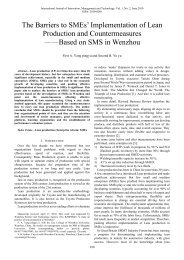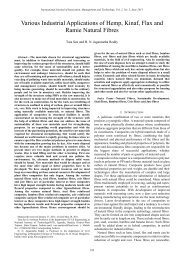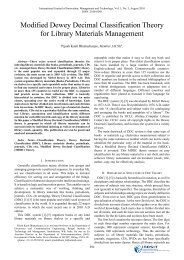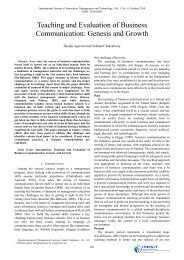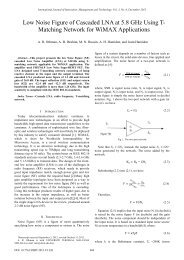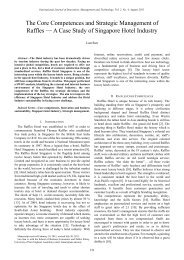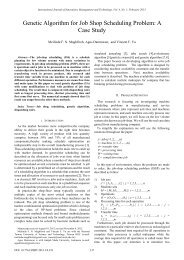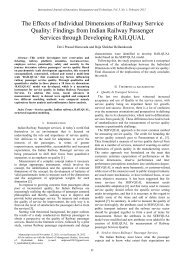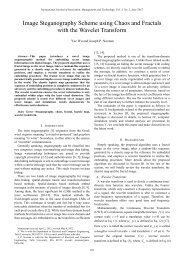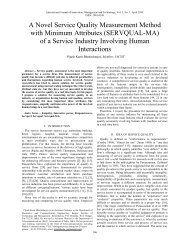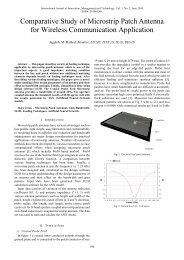Self-Efficacy, Effort, Job Performance, Job Satisfaction, and ... - ijimt
Self-Efficacy, Effort, Job Performance, Job Satisfaction, and ... - ijimt
Self-Efficacy, Effort, Job Performance, Job Satisfaction, and ... - ijimt
You also want an ePaper? Increase the reach of your titles
YUMPU automatically turns print PDFs into web optimized ePapers that Google loves.
International Journal of Innovation, Management <strong>and</strong> Technology, Vol. 3, No. 4, August 2012<br />
TABLE III: ANALYSIS OF DISCRIMINATE VALIDITY<br />
Variables <strong>Self</strong>-efficacy <strong>Effort</strong> <strong>Job</strong> performance <strong>Job</strong> satisfaction<br />
<strong>Self</strong>-efficacy 0.781*<br />
Turnover<br />
intention<br />
<strong>Effort</strong> 0.638 0.852*<br />
<strong>Job</strong> performance 0.700 0.565 0.783*<br />
<strong>Job</strong> satisfaction 0.467 0.398 0.534 0.801*<br />
Turnover intention -0.179 -0.180 -0.207 -0.290 0.777*<br />
“*”are square roots of average variable extracted (AVE)<br />
TABLE IV: HYPOTHESES-TESTING RESULTS<br />
Hypotheses<br />
Theoretical model<br />
path coefficient t value Conclusion<br />
H1:<strong>Self</strong>-efficacy & <strong>Job</strong> performance 0.65 15.65* Support<br />
H2:<strong>Self</strong>-efficacy & <strong>Job</strong> satisfaction 0.47 7.83* Support<br />
H3:<strong>Effort</strong> & <strong>Job</strong> performance 0.24 5.46* Support<br />
H4:<strong>Effort</strong> & <strong>Job</strong> satisfaction 0.24 3.68* Support<br />
H5:<strong>Job</strong> performance & Turnover intention -0.08 -1.77 Not Support<br />
H6:<strong>Job</strong> satisfaction & Turnover intention -0.24 -6.10* Support<br />
D. <strong>Effort</strong> has a Positive Effect on <strong>Job</strong> <strong>Satisfaction</strong><br />
Regarding our work, the hypotheses 4 is proposed: <strong>Effort</strong><br />
has a positive effect on <strong>Job</strong> satisfaction. The results proved<br />
the significant positive relationship between the effort <strong>and</strong><br />
job satisfaction. The results are consistent with Menguc’s<br />
(1996) [12] works. It indicated that employee’s job<br />
satisfaction would increases by finish the work in deadline,<br />
do the best to apply the abilities, <strong>and</strong> completeness of the<br />
responsibilities coverage. As the result, well-appointed<br />
scheduling, detailed the work st<strong>and</strong>ard, <strong>and</strong> the job<br />
description could assist the employees in getting more targets<br />
to measure the effort. Because of the maturely supporting<br />
policies, would enhance the effect of effort on the job<br />
satisfaction.<br />
E. <strong>Job</strong> <strong>Performance</strong> has a Negative Effect on Turnover<br />
Intention<br />
Regarding our work, the hypotheses 5 is proposed: <strong>Job</strong><br />
performance has a negative effect on Turnover intention. The<br />
result shows that there has no significant positive relationship<br />
between the job performance <strong>and</strong> turnover intention. It is<br />
inconsistent with Boshoff <strong>and</strong> Allen’s (2000) [8] work. There<br />
have a possible reason is the adoption of Karatepea’s (2005)<br />
[13] measurement that focus on self-evaluation of employees,<br />
but the external objective perspective. Employees may<br />
consider the high performance as an advantage that could<br />
help to find a better job. In this research, sales person that<br />
have large percentage of samples, balanced the rewards<br />
against the high performance mentality. Since the failure of<br />
equilibrium caused the discontent <strong>and</strong> rise the turnover<br />
intention.<br />
F. <strong>Job</strong> <strong>Satisfaction</strong> has a Negative Effect on Turnover<br />
Intention<br />
Regarding our work, the hypotheses 6 is proposed: <strong>Job</strong><br />
satisfaction has a negative effect on turnover. The analysis<br />
shows the significant positive relationship between the job<br />
satisfaction <strong>and</strong> turnover intention which is consistent with<br />
Karatepea (2005)’s [13] work. Since the little of turnover<br />
intention, the research indicates that all of the respondent are<br />
satisfy in the firm’s facilities <strong>and</strong> mechanism, such as policies,<br />
payment, work environment <strong>and</strong> so on. Firms should<br />
consider offering more policies which could reinforce the job<br />
satisfaction. For example, welfares, reward, <strong>and</strong> bonus.<br />
G. Limitations <strong>and</strong> Future Research Directions<br />
In our research, the relationship between job performance<br />
<strong>and</strong> turnover intention did not have the significant result <strong>and</strong><br />
can’t be supported. As the result, we hope to conduct further<br />
research in this area.<br />
To our measurement, because of the lake of the literature<br />
in the topics in this work which is observed by the author, we<br />
have short of the theoretical support. Therefore, the research<br />
side with the exploratory research needs the further replicated<br />
<strong>and</strong> amended.<br />
To the variables, thus we focus on the service-side, there<br />
still have other organization variables. We recommend the<br />
follow-up research to include the relevance of variables in<br />
organization theory, such as customer orientation <strong>and</strong><br />
organizational culture, etc..<br />
Another direction for further research is to assess these<br />
theories in other industry. Test in different fields, will raise<br />
the underst<strong>and</strong>ing in a great diversity of the industries.<br />
REFERENCES<br />
[1] S. Kusluvan, “Employee attitudes <strong>and</strong> behaviors <strong>and</strong> their roles for<br />
tourism <strong>and</strong> hospitality businesses,” In S. Kusluvan (Ed.), Managing<br />
employee attitudes <strong>and</strong> behaviors in the tourism <strong>and</strong> hospitality, New<br />
York: Nova Science Publishers, pp. 25–50, 2003.<br />
[2] S. George <strong>and</strong> W. A. “Total quality management: Strategies <strong>and</strong><br />
techniques proven at today’s most successful companies,” New York:<br />
Wiley.1994.<br />
[3] B. C. Krishnan, R. G. Netemeyer, <strong>and</strong> J. S. Boles, “<strong>Self</strong>-efficacy,<br />
competitiveness, <strong>and</strong> effort as antecedents of salesperson<br />
performance,” Journal of Personal Selling <strong>and</strong> Sales Management,<br />
pp.285-295, 2002.<br />
390


